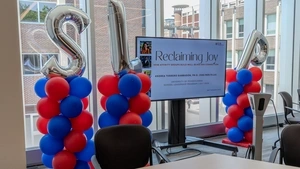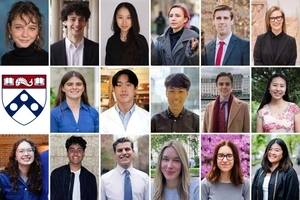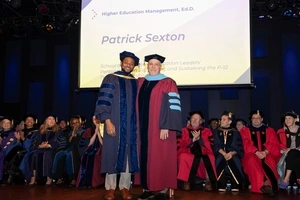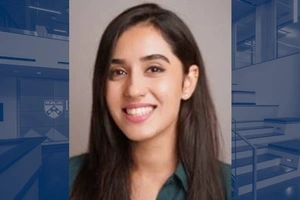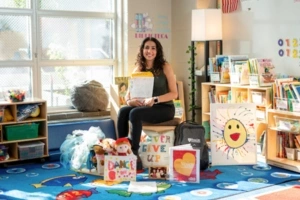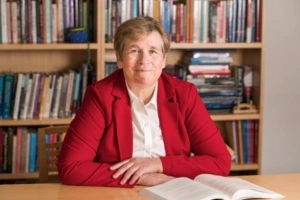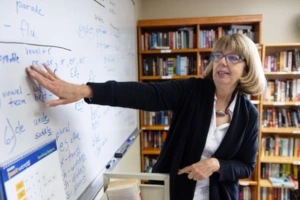
Penn GSE’s School Leadership M.S.Ed. program turns 25 this year. As leadership, students, and alums gathered on campus earlier this month to celebrate the milestone, they reflected on what makes the program special.
The anniversary event featured a reception, an awards dinner, and opportunities for students and alums to learn from one another via presentations, a panel discussion about adapting to current and developing issues in education, and a keynote address by alum and former Pennsylvania Secretary of Education Khalid Mumin on applying lessons learned in the program to graduates’ careers. The program’s impact on alums was a common thread throughout the day.
One of the many unique aspects that makes the program so successful is that it brings together aspiring leaders from across the spectrum of K–12 education, from public schools and charter school networks to independent and private schools. Penn GSE’s School Leadership program is notably one of the only leadership preparation programs in the country that specifically focuses on preparing both aspiring independent and public school leaders. And because it is an executive-format program, those students come from schools and districts from across the country.
“Our students and alums have continually expressed their gratitude for the unique learning opportunity to be part of a cohort that brings together peers not only from various sectors, but also from across regions, and have noted how this better informs their practice,” says Interim Director Jessica Richard. “This strategically designed cohort model allows them to learn alongside fellow students with a wide range of experiences, backgrounds, and school context perspectives, including students from states with different laws and school systems operating under distinct procedures.”
In addition, the program provides one-on-one mentoring throughout its duration, relying on a network of successful active and retired school leaders spanning the same diversity of schools and geographies as students. The mentoring initiative contributes to the program’s focus on bridging research and practice, as mentors can provide students insight into their real-world experiences and advice on practical applications of the theory they learn.
Longtime mentor Carlton Tucker, who served as upper school head at Princeton Day School for two decades, shared that the mentor–mentee relationships help to build the sorts of interpersonal relationships that school leaders rely on in their careers. In addition to meeting with their leadership students on campus, mentors also visit mentees at their home school sites to gain “a broader, richer sense of them” and their work, he said. And should a student need advice, their mentor is typically just a phone call away.
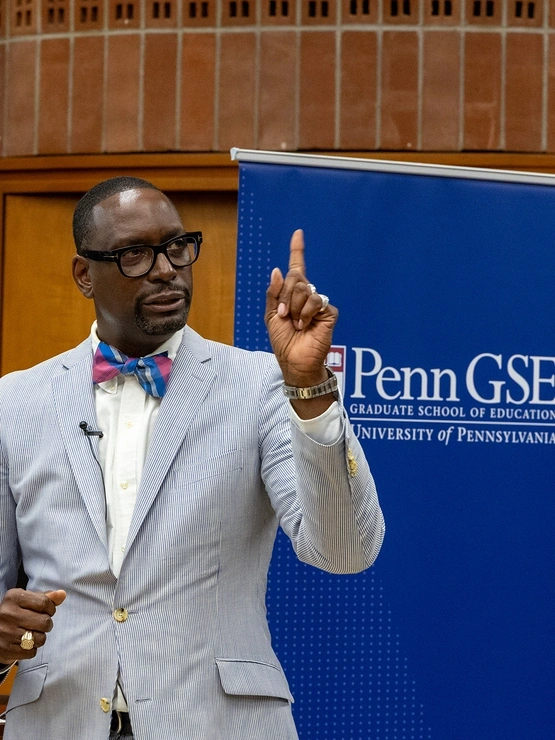
A number of program alums echoed similar sentiments about the program’s value, crediting its focus on applying research to practice, the efficacy of its mentors, and most of all, the lessons they learned from cohort members from diverse educational contexts.
“It was really the connections to my fellow classmates in my cohort and the ability to connect with mentors that helped me in my career and set the stage for where I am now,” said Brandon Herbert, a graduate who now works as director of admissions at Concord Academy.
Rachael Mattson, director of elementary and middle school literacy at Mastery Charter Schools, said her experience in the program has helped her to see both common struggles across education and different perspectives. “Because I always worked in the urban charter world,” she said, “it was really helpful to have a cohort of people who were working in both independent, private settings and traditional school districts and charter schools to not just see school leadership through the specific lens that my experience was, but through a broader lens.”
It has also better positioned her to ensure she’s meeting every student’s needs, she added.
While the program introduced Tiffany Dupree-Osei, a principal in the School District of Philadelphia, to a lot of people she “can still call on to this day,” she also benefitted from its curricular focus on case studies and practical applications.
“When I left the program, I felt really prepared to go into a school leadership position and to go into a principalship,” she said.
Outgoing Director Steve Piltch, who is handing over the reins to Richard as he retires after six years, is optimistic that the program will continue to build upon these successes.
“It’s always been a program committed to preparing leaders not just for today, but tomorrow,” Piltch says, explaining that the program has evolved to include new components to meet the ever-changing demands on school leaders. He points to the integration of culturally responsive community work and social–emotional learning as examples. Above all, he emphasizes the importance of wellbeing and relationships in leadership as a primary tenet of the program.
But what makes these lessons truly enriching and valuable to their students, he shares, is the relationships and connections they forge through the program.
“Fundamental to the program is, ‘What do we learn from each other?’” he says.
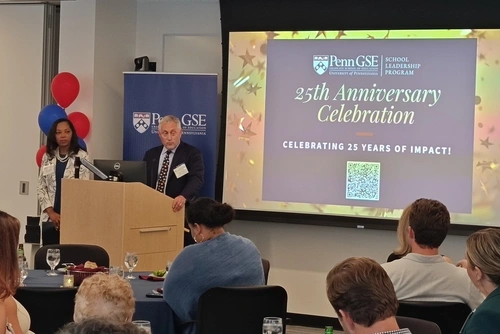
During the awards dinner to close out the anniversary event, Piltch proudly announced to the attendees that Richard, who served as his associate director for the last five years and who he warmly regards as “terrific,” is officially taking over his role leading the program. Looking ahead, Richard says she wants to continue building on the program’s adaptability to the “growing demands and needs of schools and school systems.”
“As a forward-thinking leader, I’m always reflecting on how the School Leadership program can continue to anticipate the evolving needs of future school leaders,” she says. “I’m excited to guide this meaningful work and the progressive innovation that drives it.”
Media Inquiries
Penn GSE Communications is here to help reporters connect with the education experts they need.
